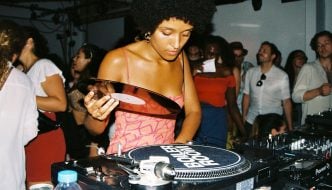 The representation of women in film has been a central concern of feminist cultural critique since Laura Mulvey penned her seminal ‘Visual Pleasure and Narrative Cinema’ in 1973. Nearly four decades later, womenkind is still suffering from the affliction of masculinist filmmaking tropes, with women on screen being largely penned by men, sexualised, subjected to violence or cast in the role of mother.
The representation of women in film has been a central concern of feminist cultural critique since Laura Mulvey penned her seminal ‘Visual Pleasure and Narrative Cinema’ in 1973. Nearly four decades later, womenkind is still suffering from the affliction of masculinist filmmaking tropes, with women on screen being largely penned by men, sexualised, subjected to violence or cast in the role of mother.
Aronofsky’s new film Mother! serves to illustrate this point in extremis. The film is predicated on heavy handed biblical allusions, and as such centred around ‘Him’ (Javier Bardem), in the ultimate patriarch role. The main protagonist (Jennifer Lawrence) is developed only in relation to her husband. She is on screen for over 80% of the film, and the establishing shots allow the viewers gaze to roam freely over her scantly clad body. This stands in for character development.
Lawrence’s role in this film is to support her suffering genius of a husband through his writers’ block (he is, we are assured, a beautiful poet). The emotional and physical labour of the housewife is thereby diminished to its subservience to the creativity of man. Similarly, the emotional and physical labour of the female actor haunts the film – Lawrence severely injured her rib during shooting, and developed a relationship with Aronofsky (the echoes in the film need no elaboration).
Lawrence’s character is repeatedly denied any agency. Even in the home she has laboured so hard to create, a stream of unwanted guests violate and degrade her space. One such intruder is Michelle Pfeiffer who, along with husband (Ed Harris), complete the biblical allusion by providing Adam and Eve. In this second female character, Aronofsky’s imagination stretches no further than the second role women are allowed to fulfil on screen: the siren.
The narrative arc of the film hinges on a scene in which ‘mother’ succumbs to the sexual aggression of her husband which she tries to fight. This is a rape scene. Worse, it is a scene in which a women denies consent and, as the assault continues, acquiesces to the man. Cut to the next morning and Lawrence’s angelic face beams: ‘I’m pregnant’. Not only does this sequence apologise for sexual aggression, but glorifies it. Through her husbands aggression, Lawrence fulfils her role in life to become a mother. Such a violently two dimensional rendering of women should leave viewers appalled that this film was allowed to reach cinemas.
Of course, Lawrence’s happiness is short lived. The final half of the film sees her beaten, her child killed, her body burnt and her heart ripped out of her body. The violence women suffer on screen reflects and feeds the violence real women suffer under patriarchy everyday. This film stokes the fire of misogyny.
The faux art-house style of the film lends this highly sexist film a veneer of high-mindedness. It’s ‘artyness’, however, amounts to little more than a disconcerting feeling that the film doesn’t make sense. Nothing is easier to write; nothing is easier to pass off as ‘art’. To often, such tropes allow troubling politics to go unnoticed. Lawrence’s character is repeatedly abused and this serves no greater purpose than inflating Aronofsky’s arrogance, who wrote the film in 5 days before inflicting it on the world.
This is not a comment on the oppression of women, but the oppression of women in action. Male directors must not be able to get away with this without facing the wrath of women. Please, do not see Mother!. If you do, be warned: this film contains apologies for rape and the aestheticisation of femicide.
Filed under: Film, TV & Tech
Tagged with: Aronofsky, Javier BArder, Jenefer Lawrence, Michelle Pfeiffer, Mother

Comments